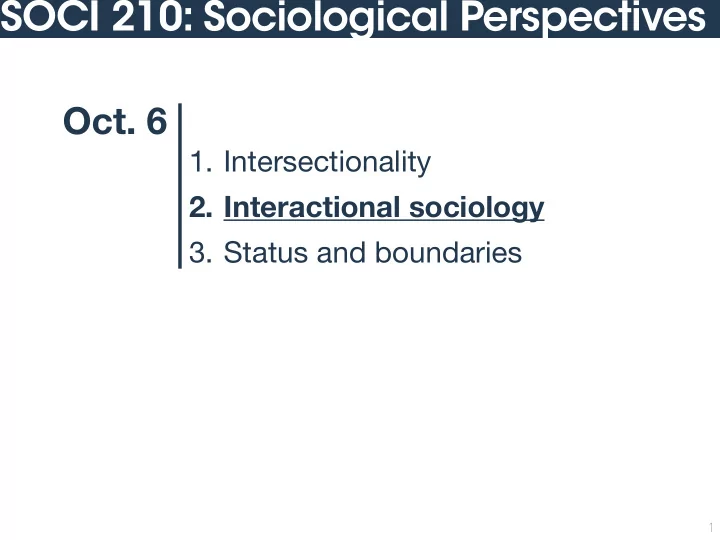

SOCI 210: Sociological Perspectives Oct. 6 1. Intersectionality 2. Interactional sociology 3. Status and boundaries 1
Interactional Sociology 2
Social interaction Interaction is a basic part of social life ⦙ Present in much of what we have discussed so far Socialization—understanding self in relation to society Symbolic interactionism as basis of ‘self’ The individual often taken for granted ⦙ Starting with the idea that there is such a thing as the individual ⦙ Discussing the ways that interactions and macro-social forces influence those individuals 3
Social interaction Interactional sociology ‘starts’ with interaction ⦙ Not just about how interaction shapes the individual or defines groups ⦙ Social interaction is the starting point from which individuals and groups arise The self as collection of the social situations we encounter ⦙ Series of interactional ‘situations’ College lecture, argument with stranger, meeting a friend ⦙ Interactional theorists : we should focus on those situations, the expectations they entail, the way they are resolved again and again From there, try to understand sense of self, agency, role Shift away from primacy of individual 4
Social interaction Goffman concluded: “not men and their moments, but moments and their men.” In gender-neutral language: not individuals and their interactions, but interactions and their individuals; not persons and their passions, but passions and their persons. “Every dog will have its day” is more accurately “every day will have its dog.” Incidents shape their incumbents, however momentary they may be; encounters make their encountees. It is games that make sports heroes, politics that makes politicians into charismatic leaders … To see the common realities of everyday life sociologically requires a gestalt shift, a reversal of perspectives. Breaking such deeply ingrained conventional frames is not easy to do; but the more we can discipline ourselves to think everything through the sociology of the situation, the more we will understand why we do what we do. Randall Collins, Interaction Ritual Chains (2004:5) 5
Dramaturgical Theory 6
Dramaturgical theory Erving Goffman (1922–1982) ⦙ Among the most well known and influential sociologists of 20th century ⦙ Defined much of the study of social interaction and how we think of roles, conversation, nonverbal communication, … 7
Dramaturgical theory Goffman’s dramaturgy ⦙ Individuals put on di ff erent faces depending on who we are interacting with ⦙ Situations necessitate ‘lines’—claims toward particular versions of ourselves Am I an engaged instructor? a disinterested observer? a critical participant? a helpful mediator? Lines depend on situation ⦙ The lines we commit to are contingent on appropriateness for the situation at hand Who is party to the interaction? What environment are we in? ⦙ Constantly switching ‘roles’ to adapt to di ff erent situations 8
Dramaturgical theory Self as collection of dramaturgical roles ⦙ At any moment, we are presenting one mask or another; enacting one part or another depending on the situation ⦙ Go ff man: there is no psychological self outside of these interactional lines ⦙ Individuals are not playing these di ff erent parts, they are those parts 9
Dramaturgical theory Interaction is impression management ⦙ Face work ⦙ Individuals work to make their lines credible, for the situation to ‘work out’ ⦙ Situations that are not working out generate a crisis of identity Strained situations ⦙ Di ff ering ideas about expectations Cultural differences in turn-taking, personal space, etc. ⦙ Conflicting roles Intersecting social spheres 10
Dramaturgical theory Interaction is impression management ⦙ Face work ⦙ Individuals work to make their lines credible, for the situation to ‘work out’ ⦙ Situations that are not working out generate a crisis of identity Strained situations ⦙ Di ff ering ideas about expectations Cultural differences in turn-taking, personal space, etc. ⦙ Conflicting roles Intersecting social spheres Impression management is a group task ⦙ Usually, everyone wants the situation to ‘work out’ Possible exception: trolling ⦙ Embarrassment is the result of situations not being maintained 11
Recommend
More recommend